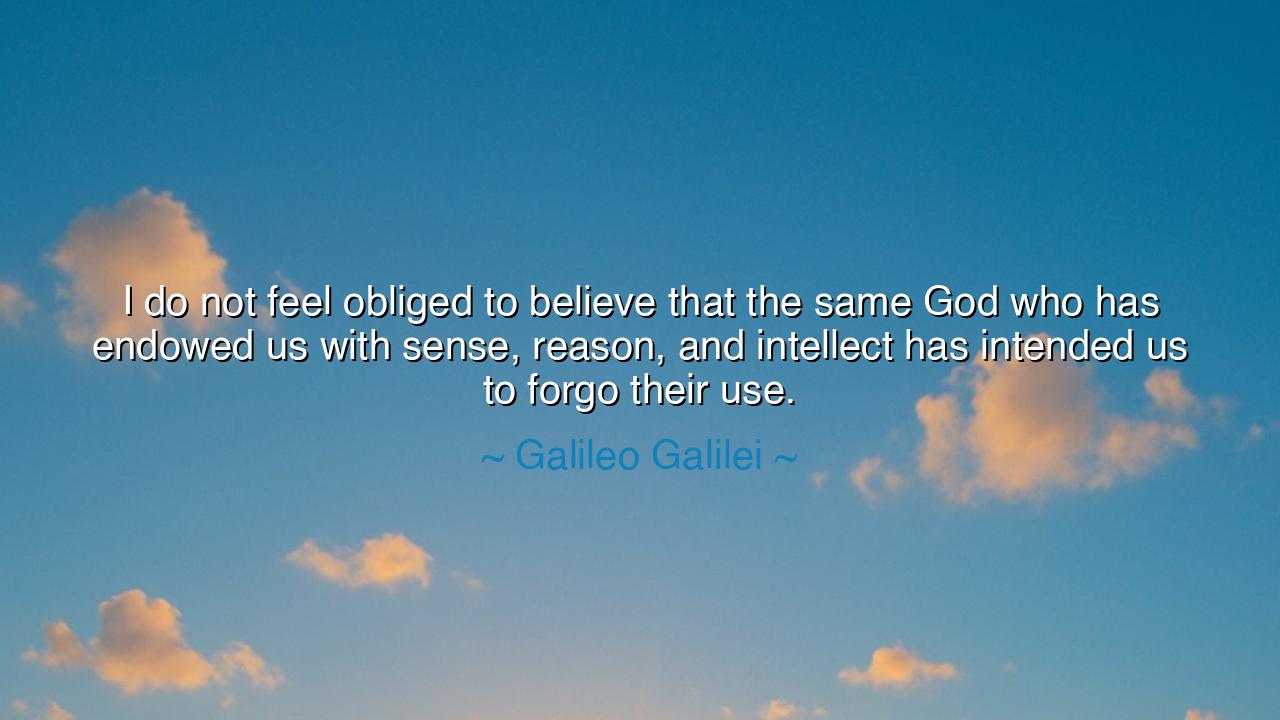
I do not feel obliged to believe that the same God who has
I do not feel obliged to believe that the same God who has endowed us with sense, reason, and intellect has intended us to forgo their use.






Hear the immortal words of Galileo Galilei, the star-gazer of Florence, who once declared: “I do not feel obliged to believe that the same God who has endowed us with sense, reason, and intellect has intended us to forgo their use.” In this statement burns the fire of both faith and defiance—a harmony between reverence and reason. Galileo spoke as one who had looked into the heavens and seen the handwriting of the Divine written not only in sacred texts, but in the movement of the stars themselves. His words ring across centuries as a call to the human spirit: to think is not rebellion against God, but obedience to Him.
The origin of this quote lies in the crucible of one of history’s great confrontations—the struggle between science and dogma. Galileo, armed with his telescope, had dared to confirm the truth first proposed by Copernicus: that the earth moved around the sun, not the sun around the earth. In his time, this truth was considered heresy, for it challenged the authority of those who claimed to speak for God. Yet Galileo, guided by both faith and intellect, could not deny the evidence of his eyes and the logic of his mind. When he uttered these words, it was not to mock heaven, but to honor it—to affirm that the God of creation must also be the God of understanding.
In saying this, Galileo redefined what it meant to be faithful. For him, faith and reason were not enemies locked in eternal struggle, but twin wings by which the soul ascends toward truth. If God had given man the capacity to question, to observe, to calculate, and to wonder, then surely these were not traps but gifts. To refuse their use out of fear was, in his eyes, the true blasphemy. Galileo understood that intellect is a form of worship—that when we seek truth with honesty and humility, we honor the Creator who made truth itself. His faith was not in the fragility of tradition, but in the grandeur of divine order, which no discovery could ever diminish.
Consider the scene: the aging scientist standing before the tribunal of the Inquisition, accused of corrupting the faithful, forced to deny what his instruments and reason had proven. Around him, men trembled before the thought of change, fearing that to accept new truth was to betray old faith. Yet in his heart, Galileo remained unbroken. Even as he bent his knees to authority, he whispered defiance to ignorance. Legend tells us that after recanting, he muttered, “E pur si muove”—“And yet it moves.” Whether apocryphal or true, that whisper became a roar across the ages: the assertion that truth cannot be silenced, for it is sustained by both reason and God Himself.
Galileo’s insight extends beyond science—it speaks to every realm where fear stifles thought. Many in our own time still mistake obedience for faith and silence for virtue. They believe that to question is to doubt, and to doubt is to sin. But Galileo teaches that questioning is sacred, for it is the way by which understanding grows. The mind, like a muscle, withers when it is forbidden to stretch. Reason, far from leading us away from God, leads us deeper into His mystery. Each discovery—each law of motion, each spark of insight—reveals a new facet of the infinite.
Even the scriptures, rightly understood, invite this harmony. “Come, let us reason together,” says the Lord in the prophet’s voice. The same God who crafted the stars also crafted the human mind to wonder at them. To forgo intellect, as Galileo warned, is to reject part of the divine image within us. The Creator did not design mankind as blind servants but as seekers, capable of reading both the book of revelation and the book of nature. When we use our minds to explore, to heal, to build, to uplift—we participate in the ongoing creation of the world.
Therefore, let this truth be passed down: faith and reason are not adversaries, but allies. To believe without thought is folly; to think without awe is emptiness. The wise soul weds both—believing deeply, yet never ceasing to seek understanding. When you look upon the sky, upon the mystery of existence, let your heart worship and your mind inquire, for both are sacred acts. To use the gifts of sense, reason, and intellect is not rebellion—it is reverence made manifest.
And so, O child of thought and faith, heed Galileo’s lesson. Dare to question, but do so with humility. Seek truth, not for vanity, but for wonder. Use your mind not to defy God, but to draw nearer to Him, for the more you understand His creation, the more deeply you will know His majesty. For truly, as Galileo saw through his telescope and his soul, the light of reason is the reflection of the light of God.






AAdministratorAdministrator
Welcome, honored guests. Please leave a comment, we will respond soon